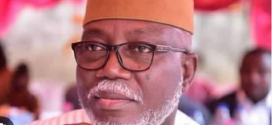If the late Chief of Staff to the President, Abba Kyari, were a citizen of a western country, his obituary would have been written at least 10 years ago in anticipation of his eventual death. Like most famous people and highly placed public officials, his obituary would have been extensively researched, written with as much objectivity as can be managed, and stored somewhere. Occasionally, an editor would update the article with some ongoing details of his life, such as when he was appointed CoS and how he would go on to earn the reputation of a strong man. However, Nigerians (even Africans, generally) do not have that culture of forewritten obituaries. We are a superstitious people, we treat life as interminable, and so, hiring people to write obituaries of those still living might draw the ire of the public. Consequently, each time a famous person dies in Nigeria, we have had to endure hastily written and mostly tawdry obituaries.
Since the death of Kyari, we have been treated with a surprising deluge of obituaries and tributes from friends, proteges, and colleagues. I am not sure even the President could have done better in collecting posthumous accolades. There are several interesting things I noted from all these articles falling over themselves to beatify Kyari. One of them is that these obituaries were written by men and mostly by southerners, especially Yoruba ones. Many things can be apprehended about Kyari from reading all those obituaries. However, I choose to focus on the ways these various articles have tried rather too hard to push forth the image of a cosmopolitan, urbane, generous, hardworking, intellectual, and an “absolutely incorruptible” man.
If there is something to note about the nature of obituaries, it is that they are not for the dead. They are written for the living. No dead person ever gets to care about the kind or unkind things that we say about them in their obituaries, only the living does. Dead men do not read; neither do they write rejoinders. Only the living is affected by obituaries. Sometimes, one comes across an obituary where the bereaved write directly to the deceased to tell them how much they love them. In such instances, you know they are not speaking to the dead. They are sending a message to the living. That is why we should be questioning the many hagiographic obituaries of Kyari and their strong push to shape public memory since his death was announced. We should view all of these effusive outpourings of tributes with a measure of scepticism, question what the underlying political agenda of these obituaries is, and who will ultimately benefit from a revised history of his life. Otherwise, we will end up being duped by sweet words.
While most of us did not know him personally to contest any of the things said about him, I think we should also reiterate that the criticisms of him while he held office as the CoS were never about his manners or personal qualities. The issue was about what he ultimately represented: the political class. No matter how much/little he cared enough for his closest allies to see “his other side,” and how much important it was to him to show select people that he was no “monster,” the fact remains that he worked in the upper echelons of one of the most regressive and most repressive governments in Nigerian history. Nothing Abba Kyari was to his family and friends can redeem what he ultimately embodied: lousy governance, blind leadership, and political power abused by self-serving individuals.
 Hottestgistnaija.com
Hottestgistnaija.com




